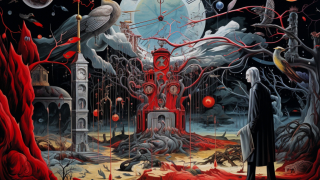Progressivism, the armed rearguard of neo-liberalism
This morning I received an advertisement, from Micromega magazine, a progressive magazine par excellence, to which I have also contributed in the past. The communication announced the release, in bookshops and online, of the new volume entitled “Against the family. Critique of an (anti-)social institution”. I quote below the introductory comment.
“The family as a social institution is, not since today, an object of analysis and criticism. In the course of history, its overcoming has been the objective both of emancipation projects based on an idea of sharing property and work, and of totalitarian political projects, which saw in it and in the affiliations and loyalties of which it is made up an obstacle to the relationship between citizens and the state.
There is no doubt that today we are faced with an overbearing return of the rhetoric of family and blood ties. So, what does it mean today to proclaim oneself 'against the family', as MicroMega has chosen to title the fourth volume of this 2024 in bookshops from 25 July? Certainly not to question the bonds of affection and mutual care that are created within the family, but to focus on and critically analyse all its anti-political and anti-social aspects: AMORAL FAMILISM; the TENDENCY TO MINIMISE AUTHORITY AND CREDIBILITY OF SCHOOLS, in the desire to stand as the sole educational agency of their children; the role played in the TRANSMISSION OF RIGID GENDER ROLES; the CONCENTRATION OF LARGE CAPITAL TRANSMITTED BY HEREDITY resulting in social immobility. .. On the other hand, it is very often the shortcomings of the state that induce individuals to resettle within the closest community, first and foremost the family, in a vicious circle that needs to be broken up, in order to guarantee each person's full right to the unfolding of his or her own personality.” [emphasis mine].
Some commentary is in order, examining in detail the above allegations against the family order. I think this is useful to show how this position set out by Micromega represents in an emblematic form some of the underlying reasons why cultural progressivism has become, in the contemporary context, a socially destructive, politically dissolving and ethically catastrophic entity.
The attack on the family institution in progressive or “left-wing” circles is of course nothing new, but as always in cultural developments the context in which a thesis is proposed and developed is no less important than the theses themselves. In the nineteenth-century context in which criticism of the family institution first developed, some of the theses recalled here, such as the reference to amoral familism, may have had a relative basis.
Let us recall that the concept of “amoral familism” was introduced by the American political scientist Edward C. Banfield in his book The Moral Basis of a Backward Society (1958), the result of a nine-month stay in the village of Chiaromonte (Basilicata). This experience apparently allowed Banfield to draw conclusions of general value on the negative role of the nuclear family as the bearer of socio-economic backwardness, due to its inherent selfishness. Seventy years later, the sloppiness of Banfield's analysis, 188 pages devoid of any noteworthy historical or comparative analysis, is apparent. But this does not detract from the fact that the concept of amoral familism has managed to spread as one of the many crowbars used to unhinge any legitimization of the family order. That the nuclear family, under specific historical conditions, can assume an eminently defensive and self-referential role is certain, but that this is somehow a qualifying characteristic of the nuclear family and its internal loyalties, this is untenable nonsense. Be that as it may, in an expansive phase of modern society, in which, at least in principle, structured state institutions were beginning to make way, it might have been plausible to see in some resistance and mistrust of traditional family structures a restraining, 'regressive' factor. The prototype of this regressive function could be a model of familism visible in certain forms of organized crime (the “Godfather”-type familism). But the real question here is to understand to what extent in 21st century Europe Vito Corleone's “famigghia” represents a real factor of antisocial destabilization. The impression is that certain intelligentsia draws its sources on social reality more from Netflix than from a look at the surrounding reality.
The second serious indictment that Micromega feels it must ascribe to the family is that of “undermining the authority and credibility of the school”. (OK, don't laugh). Here, again, we find ourselves in an analytical context that seems to be born in 1960s society. We seem to have solid, impermeable families around us, but with high illiteracy rates, which act as a barrier to the enlightenment of reason brought by the new schooling. It is just that whereas sixty years ago a deprovincializing and formative function of the state school could be sustained, today the school is besieged by hetero-directed, Americanized, highly ideological programs, with a simultaneous reduction of knowledge in favour of “skills” (the externality of attitudes and behaviour). At the same time, families are increasingly powerless and slammed, besieged in turn by the ubiquitous “screens” that “educate” their children 24 hours a day to the values of TikTok and Walmart. Micromega's intellectuals look as if they have just defrosted, having entered a freezer when “maestro Manzi” was on television.
The third indictment is complementary to the second: the family would play a regressive role because it would be complicit in the “transmission of rigid gender roles”. Now, apart from the fact that it is highly doubtful that this corresponds to some extent to the truth today, the real question is: exactly who would be responsible for educating children in matters such as affectivity or the horizon of expectations regarding sex and gender? To Micromega? To Fedez? To MinCulPop? To the Kibbutz? To the Soviets? To Agenda 2030? Are they touched by the doubt that the idea of possessing superior wisdom on issues such as primary affectivity is blatantly authoritarian?
The fourth indictment is perhaps the most comical: the family favours social immobility because it encourages the concentration of capital by inheritance. Emerging from their nineteenth-century freezer, the intellectuals of Micromega certainly have the Buddenbrooks before their eyes. They imagine families of top-hatted capitalists with a Protestant work ethic passing on family business and capital to their blood descendants. The anonymous character of today's multinationals and investment funds seems to have escaped them. What is more, the family model that fueled the concentration of capital is not even 19th century capitalism. One has to go back to the majorat - abolished with the Napoleonic Code - where only the first-born inherited (to avoid the splitting of capital). Here, to imagine that today the tendency of capital to concentrate in a capitalist regime is due to family inheritance is a striking indication of how the Left no longer even handles those elements of economics that it once prided itself on. And moreover, where this tendency existed, where we were still in the midst of the majorities, obviously the problem would be what the legislation allows, certainly not the existence of a family system.
In short, the stale attack on the family that Micromega believes it has to make is motivated by a collection of untenable pretexts. But the real, profound motivation is the one that peeps out in the final considerations above, and it is a purely IDEOLOGICAL motivation: the family is one of the “closest communities”, which progressive pseudo-enlightenment (in reality unconscious neo-liberalism) demands to break up in order to “guarantee each person the unfolding of his or her personality”.
Apart from the hooey about the “anti-social and anti-political” character of the family, the family order, and community orders in general, are a scandal for today's neo-liberal left because they do not fit the demands of mercatist individualism - the only dimension of freedom they are still capable of imagining.
The model of freedom they propose is the wet dream of the big capital they pretend to oppose. They dream of uprooted, isolated individuals, who seek consolation by strolling through the great supermarket that has become the western world. They dream of individuals who are fragile, fluid and therefore willing to be placed without resistance in every nook and cranny of the global machinery. They actively collaborate in the dissolution of any stable identity, collective as much as personal, which could act as a bulwark against the liquefaction of market relations.
I do not know whether this operation is the result of blatant complicity with the neo-liberal paradigm, or whether it is merely a sign of a dramatic cultural unawareness, but in the end this matters just the right amount: intentions count for only so much, and what remains in future memory is just one more contribution to the current degradation.
Translation by Costantino Ceoldo














